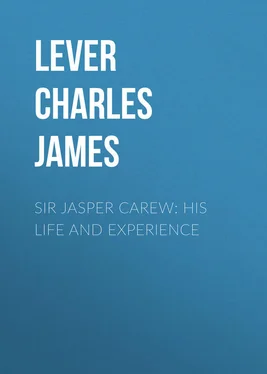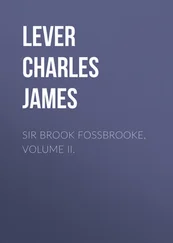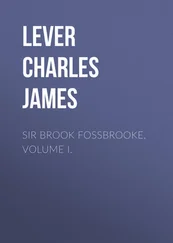Charles Lever - Sir Jasper Carew - His Life and Experience
Здесь есть возможность читать онлайн «Charles Lever - Sir Jasper Carew - His Life and Experience» — ознакомительный отрывок электронной книги совершенно бесплатно, а после прочтения отрывка купить полную версию. В некоторых случаях можно слушать аудио, скачать через торрент в формате fb2 и присутствует краткое содержание. Жанр: literature_19, foreign_antique, foreign_prose, на английском языке. Описание произведения, (предисловие) а так же отзывы посетителей доступны на портале библиотеки ЛибКат.
- Название:Sir Jasper Carew: His Life and Experience
- Автор:
- Жанр:
- Год:неизвестен
- ISBN:нет данных
- Рейтинг книги:5 / 5. Голосов: 1
-
Избранное:Добавить в избранное
- Отзывы:
-
Ваша оценка:
- 100
- 1
- 2
- 3
- 4
- 5
Sir Jasper Carew: His Life and Experience: краткое содержание, описание и аннотация
Предлагаем к чтению аннотацию, описание, краткое содержание или предисловие (зависит от того, что написал сам автор книги «Sir Jasper Carew: His Life and Experience»). Если вы не нашли необходимую информацию о книге — напишите в комментариях, мы постараемся отыскать её.
Sir Jasper Carew: His Life and Experience — читать онлайн ознакомительный отрывок
Ниже представлен текст книги, разбитый по страницам. Система сохранения места последней прочитанной страницы, позволяет с удобством читать онлайн бесплатно книгу «Sir Jasper Carew: His Life and Experience», без необходимости каждый раз заново искать на чём Вы остановились. Поставьте закладку, и сможете в любой момент перейти на страницу, на которой закончили чтение.
Интервал:
Закладка:
It is not my object, perhaps as little would it be the reader’s wish, to enter on any description of the table-talk, where debates in the House, duels, curious assize cases, hard runs with fox-hounds, adventures with bailiffs, and affairs of gallantry all followed pell-mell, in wild succession. None were above telling of their own defeats and discomfitures. There was little of that overweening self-esteem which in our time stifles many a good story, for fear of the racy ridicule that is sure to follow it. Good fellowship and good temper were supreme, and none felt that to be offence which was uttered in all the frank gayety of the bottle. Even then the western Irishman had his distinctive traits; and while the taste for courtly breeding and polished manners was gradually extending, he took a kind of pride in maintaining his primitive habits of dress and demeanor, and laughed at the newfangled notions as a fashionable folly that would last its hour and disappear again. Of this school was a certain Mr., or rather, as he was always called, “Old Bob Ffrench,” the familiar epithet of Bitter Bob being his cognomen among friends and intimates. I am unwilling to let my readers suppose, even for a moment, that he really deserved the disparaging prefix. He was, indeed, the very emblem of an easy-tempered, generous-hearted old man, the utmost extent of whose bitterness was the coarseness of a manner that, however common in his own country, formed a strong contrast to the tone of the capital. Although a man of a large fortune and ancient family, in his dress and appearance he looked nothing above the class of a comfortable farmer. His large loose brown coat was decorated with immense silver buttons, and his small clothes, disdaining all aid from braces, displayed a liberal margin of linen over his hips; but his stockings were most remarkable of all, being of lamb’s wool and of two colors, a light-brown and blue, – an invention of his own to make them easy of detection if stolen, but which assuredly secured their safety on better grounds. He was a member of Parliament for a western borough; and despite many peculiarities of diction, and an occasional lapse of grammar, was always listened to with attention in the House, and respected for the undeviating honor and manly frankness of his character. Bob had been, as usual, an able contributor to the pleasures of the evening; he had sung, told stories, joked, and quizzed every one around him, and even, in a burst of confidence, communicated the heads of a speech he was about to make in the House on the question of reform, when he suddenly discovered that his snuffbox was empty. Now, amongst his many peculiarities, one was the belief that no man in Ireland knew how to apportion the various kinds of tobacco like himself, and Bob’s mixture was a celebrated snuff of the time.
To replenish his box he always carried a little canister in his great-coat pocket, but never would intrust the care of this important casket to a servant; so that when he saw that he was “empty,” he quietly stole from the room and went in search of his great-coat. It was not without some difficulty that he found his way through the maze of rooms and corridors to the antechamber where he had deposited his hat and coat. Having found it at last, however, he set out to retrace his steps; but whether it was that the fresh air of the cool galleries, or the walking, or that the wine was only then producing its effects, certain is it Mr. Ffrench’s faculties became wonderfully confused. He thought he remembered a certain door; but, to his misery, there were at least half-a-dozen exactly like it; he knew that he turned off into a passage, but passages and corridors opened on all sides of him. How heartily did he curse the architect that could not build a house like all the world, with a big hall, having the drawing-room to the left and the dinner-room to the right, – an easy geography that any one could recollect after dinner as well as before. With many a malediction on all newfangled notions, he plodded on, occasionally coming to the end of an impassable gallery, or now straying into rooms in total darkness. “A blessed way to be spending the evening,” muttered he to himself; “and maybe these rascals are quizzing me all this time.” Though he frequently stopped to listen, he never could catch the sounds of a conviviality that he well knew was little measured, and hence he opined that he must have wandered far away from the right track. In the semi-desperation of the moment, he would gladly have made his escape by a window, and trusted to his chance of discovering the hall door; but unfortunately the artifices of a modern window-bolt so completely defied his skill that even this resource was denied him. “‘I’ll take one ‘cast’ more,” muttered he, “and if that fails, I ‘ll lie down on the first snug place I can find till morning.” It became soon evident to him that he had, at least, entered new precincts; for he now found himself in a large corridor, splendidly lighted, and with a rich carpeting on the floor. There were several doors on either side, but although he tried them each in turn, they were all locked. At last he came to a door at the extreme end of the gallery, which opened to his hand, and admitted him into a spacious and magnificently furnished apartment, partially lit up, and by this deceptive light admitting glimpses of the most rare and costly objects of china, glass, and marble. It needed not the poetizing effects of claret to make Bob fancy that this was a fairy palace; but perhaps the last bottle contributed to this effect, for he certainly stood amazed and confounded at a degree of magnificence and splendor with which he had never seen anything to compare. Vainly endeavoring to peer through the dubious half light, and see into the remote distance of the chamber, Ffrench reached the middle of the room, when he heard, or thought he heard, the rustling sounds of silk. It was in the days of hoops and ample petticoats. He turned abruptly, and there stood directly in front of what, in his own description, he characterized as “the elegantest crayture ye ever set eyes upon.” Young, beautiful, and most becomingly dressed, it is no wonder if my mother did produce a most entrancing effect on his astounded senses. Never for a moment suspecting that his presence was the result of an accident, my mother courtesied very low, and, with a voice and a smile of ineffable sweetness, addressed him. Alas! poor Bob’s mystifications were not to end here, for she spoke in French, and however distinguished the City of the Tribes might be in many respects, that language was but little cultivated there. He could, therefore, only bow, and lay his hand on his heart, and look as much devotion, respect, and admiration as it was in his power to express at that late hour of the evening.
“Perhaps you’ll accept of a cup of tea?” said she at length, leading the way towards the table; and as Ffrench said, afterwards, that he never declined drink, no matter what the liquor, he readily consented, and took his place beside her on the sofa. Full of all my father’s lessons and precepts about the civilities she was to bestow on the Irish gentlemen and their wives, the importance of creating the most favorable impression on them, and ingratiating herself into their esteem, my mother addressed herself to the task in right earnest. Her first care was to become intelligible, and she accordingly spoke in the slowest and most measured manner, so as to give the foreigner every possible facility to follow her. Her second was to impose as little necessity on her companion for reply as it was possible. She accordingly talked on of Ireland, of the capital, the country, the scenery about them, the peasantry, – everything, in short, that she could think of, and always in a tone of praise and admiration. The single monosyllable “oui” was the whole stock of old Bob’s French, but, as he often remarked, “we hear of a man walking from Ballinasloe to Dublin with only tu’pence in his pocket; and I don’t see why he should not be able to economize his parts of speech like his pence, and travel through the French dictionary with only one word of it!” Bob’s “oui” was uttered, it is true, with every possible variety of tone and expression. It was assent, conviction, surprise, astonishment, doubt, and satisfaction, just as he uttered it. So long debarred from all intercourse with strangers, it is not improbable that my mother was perfectly satisfied with one who gave her the lion’s share of the conversation. She certainly seemed to ask for no higher efforts at agreeability than the attention he bestowed, and he often confessed that he could have sat for a twelvemonth listening to her, and fancying to himself all the sweet things that he hoped she was saying to him. Doubtless not ignorant of her success, she was determined to achieve a complete victory, for after upwards of an hour speaking in this manner, she asked him if he liked music. Should she sing for him? The “oui” was of course ready, and without further preface she arose and walked over to the pianoforte. The fascination which was but begun before was now completed, for, however weak his appreciation of her conversational ability, he could, like nearly all his countrymen, feel the most intense delight in music. It was fortunate, too, that the tastes of that day did not rise beyond those light “chansonettes,” those simple melodies which are so easy to execute that they are within the appreciation of the least-educated ears.
Читать дальшеИнтервал:
Закладка:
Похожие книги на «Sir Jasper Carew: His Life and Experience»
Представляем Вашему вниманию похожие книги на «Sir Jasper Carew: His Life and Experience» списком для выбора. Мы отобрали схожую по названию и смыслу литературу в надежде предоставить читателям больше вариантов отыскать новые, интересные, ещё непрочитанные произведения.
Обсуждение, отзывы о книге «Sir Jasper Carew: His Life and Experience» и просто собственные мнения читателей. Оставьте ваши комментарии, напишите, что Вы думаете о произведении, его смысле или главных героях. Укажите что конкретно понравилось, а что нет, и почему Вы так считаете.











